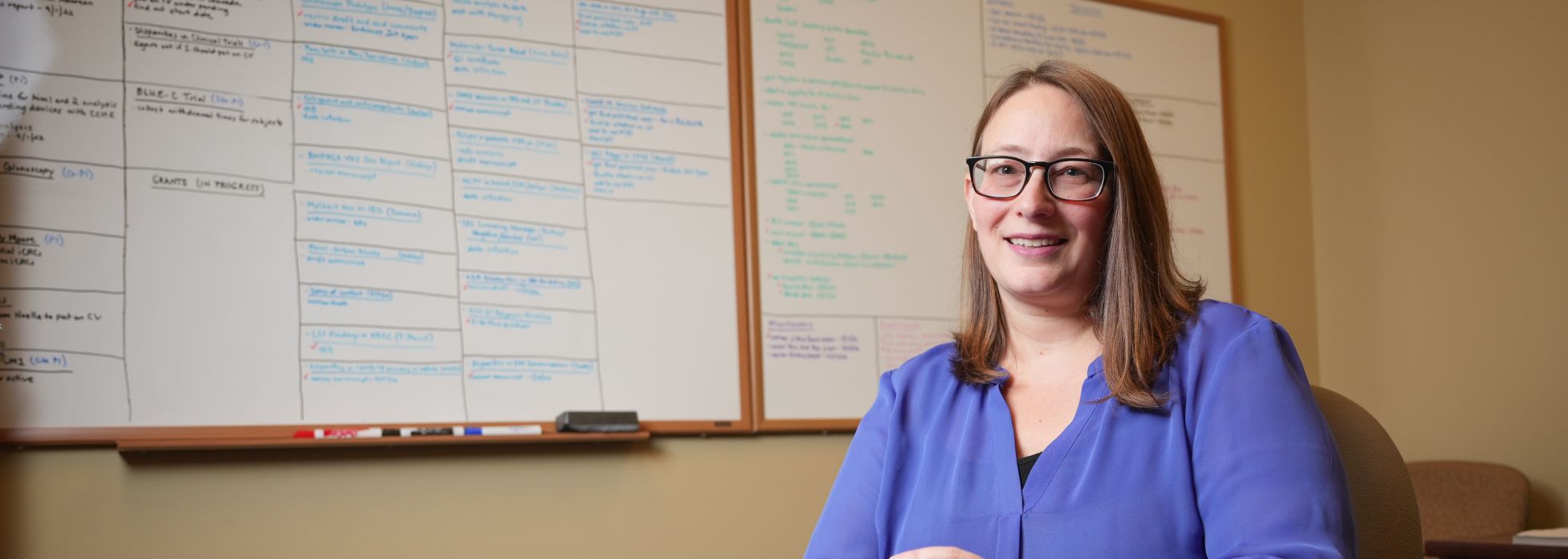Colorectal Cancer Screening
Jennifer M. Weiss, MD, MS, is an established researcher with expertise in colorectal cancer screening and hereditary GI cancer syndromes. Her main research interest focuses on improving colorectal cancer screening rates in high-risk and average-risk populations.

Improving Screening Rates
Colorectal cancer is the second leading cause of cancer related death in both the United States and Wisconsin for men and women combined. It is the most preventable, yet the least prevented cancer due to low uptake of colorectal cancer screening. There are also significant disparities in colorectal cancer screening rates across geographic locations (rural versus urban), racial and ethnic minority groups, and insurance status.
Dr. Weiss’s lab is investigating successful colorectal cancer screening strategies in high-performing clinics in rural and urban areas, as well as for populations with historically low screening rates, with the goal of disseminating those to lower-performing clinics.
Improving Screening Quality
The lab also focuses on improving quality of colorectal cancer screening programs. Specifically, she is working to develop and implement a measure for overall and modality-specific interval colorectal cancer rates for possible adoption at the state-and national-level.
By improving colorectal cancer screening rates and the quality of screening programs, Dr. Weiss hopes to reduce the incidence and mortality of colorectal cancer.
Research Team
Senior Research Specialist
Active Projects
- Comparison of Successful Colorectal Cancer Screening Strategies in Wisconsin Rural and Urban Settings
Colorectal cancer (CRC) is the most preventable cancer. However, it is the second leading cause of cancer deaths in Wisconsin, where one in four eligible individuals remains unscreened.
The goal of this project is to identify successful CRC screening strategies used in high-performing rural and urban clinics overall and for populations with historically low screening that can be disseminated to lower-performing rural and urban clinics.
- Identifying Colorectal Cancer Screening Strategies in Rural Communities
Individuals living in rural communities are significantly less likely to undergo colorectal cancer (CRC) screening, which results in more cases and higher mortality from CRC compared to urban areas.
Our goal is to characterize healthcare system and clinic factors that distinguish high- from lower-performing rural primary care clinics and identify successful CRC screening strategies used in high-performing clinics that can be applied to lower-performing rural clinics.
- Measuring Modality-Specific Interval Colorectal Cancer Rates Across Healthcare Systems
Interval colorectal cancers (CRC) are cancers identified after a negative screening exam and before the date of the next recommended exam.
This project aims to develop and implement a measure for overall interval CRC rates, as well as modality-specific interval cancer rates across CRC screening programs in multiple healthcare systems.
- Understanding and Addressing Health Disparities in Wisconsin Through Statewide Partnerships
We are connecting academic institutions with health systems, payers, and communities to build sustainable systems that measure, monitor, and reduce disparities through best practices and evidence-based innovations.
Funding Support
Dr. Weiss’s research is funded by the Wisconsin Partnership Program, the UW Carbone Cancer Center, the Gordon and Betty Moore Foundation, Exact Sciences, the American Cancer Society, and the National Institutes of Health/National Cancer Institute.


